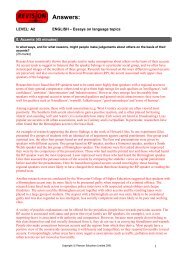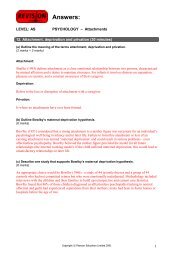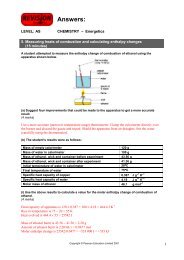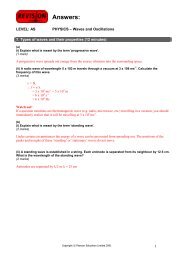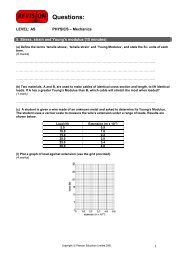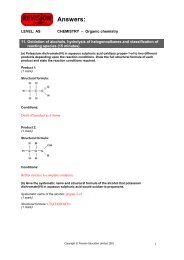7. Women are inferior to men (45 minutes) - Pearson
7. Women are inferior to men (45 minutes) - Pearson
7. Women are inferior to men (45 minutes) - Pearson
Create successful ePaper yourself
Turn your PDF publications into a flip-book with our unique Google optimized e-Paper software.
Answers:<br />
LEVEL: A2<br />
ENGLISH – Essays on language <strong>to</strong>pics<br />
<strong>7.</strong> <strong>Wo<strong>men</strong></strong> <strong>are</strong> <strong>inferior</strong> <strong>to</strong> <strong>men</strong> (<strong>45</strong> <strong>minutes</strong>)<br />
How far would you agree that the English language reflects and promotes the view that wo<strong>men</strong> <strong>are</strong><br />
<strong>inferior</strong> <strong>to</strong> <strong>men</strong>?<br />
(25 marks)<br />
Over the last few decades, linguists such as Deborah Cameron and Dale Spender (who wrote the landmark text<br />
'Man Made Language') have analysed the English language and argued that in a variety of ways it systematically<br />
denigrates wo<strong>men</strong>. They see this as the inevitable consequence of patriarchal western societies, in which wo<strong>men</strong><br />
have traditionally been accorded less status than <strong>men</strong>.<br />
Much of their research focuses on the vocabulary that we use. There <strong>are</strong> more negative words for wo<strong>men</strong> than<br />
for <strong>men</strong>, and more words with negative associations. This is especially app<strong>are</strong>nt if we comp<strong>are</strong> the associations<br />
of 'female' words with those of the equivalent 'male' words. Often the female words have acquired pejorative<br />
meanings and connotations. An example is 'spinster' and 'bachelor'. Both words denote individuals who <strong>are</strong><br />
unmarried. However, whereas 'bachelor' often suggests someone who is young and leading a c<strong>are</strong>free, enviable<br />
lifestyle ( as in the collocations 'eligible bachelor' and 'bachelor pad' ), 'spinster' is more likely <strong>to</strong> imply that the<br />
person referred <strong>to</strong> is older and possibly plain and unattractive. Another example is 'sir' and 'madam'. Both can<br />
imply a <strong>to</strong>ne of courtesy and respect (as in 'Dear Sir or Madam'), but 'madam' can also be used <strong>to</strong> describe a<br />
young woman whose behaviour is objectionable or a woman who is in charge of a brothel. There <strong>are</strong> also more<br />
insulting and patronising words for wo<strong>men</strong> than for <strong>men</strong>. Some of these degrade wo<strong>men</strong> by comparing them <strong>to</strong><br />
animals ('cow', 'bitch', 'dog') or <strong>to</strong> food ('tart', 'crumpet').<br />
Another aspect of English vocabulary relevant <strong>to</strong> this issue is the generic use of 'man' and 'mankind' - that is, the<br />
use of these words <strong>to</strong> refer <strong>to</strong> the human race in general. This is evident in such sentences as 'Anthropology is<br />
the study of man' or 'We must work <strong>to</strong>gether <strong>to</strong> safeguard the future of mankind'. The words 'woman' and<br />
'womankind' cannot of course be used in this generic way. Dale Spender argues that the generic use of 'man' is<br />
evidence of 'a language based on the premise that the world is male unless proven otherwise'.<br />
Sexist attitudes <strong>are</strong> also said <strong>to</strong> be reflected in - and reinforced by - traditional rules of English grammar. It is<br />
considered 'correct' <strong>to</strong> follow neutral words such as 'anyone' and 'nobody' with masculine pronouns. An example<br />
would be a sentence such as 'Anyone can do it if he tries'. Here it is traditional <strong>to</strong> say 'he' rather than 'she', while<br />
'they try' would be considered technically incorrect because 'anyone' is a singular pronoun. Also relevant is the<br />
convention regarding the order of male and female words. When we use pairs of male and female words it is<br />
traditional <strong>to</strong> place the male word first: 'husband and wife', 'male and female', 'Sir or Madam' and so on.<br />
Textbooks of English grammar have reinforced this convention for hundreds of years. In 1646 the grammarian<br />
Joshua Poole argued that it was more 'natural' and more 'proper' that the male word should precede the female<br />
word, because <strong>men</strong> were the 'worthier sex'. There <strong>are</strong> one or two exceptions, but even here sexist attitudes seem<br />
<strong>to</strong> be implicit. We say 'mother and father' (or 'mum and dad') rather than the other way round, suggesting that the<br />
raising of children is predominantly a female responsibility.<br />
Copyright © <strong>Pearson</strong> Education Limited 2001 1
Answers:<br />
LEVEL: A2<br />
ENGLISH – Essays on language <strong>to</strong>pics<br />
There is, therefore, ample evidence <strong>to</strong> support the argu<strong>men</strong>t that 'the English language reflects and promotes the<br />
view that wo<strong>men</strong> <strong>are</strong> <strong>inferior</strong> <strong>to</strong> <strong>men</strong>'. However, it is important <strong>to</strong> note that growing aw<strong>are</strong>ness of sexual<br />
inequality (in society as a whole as well as in relation <strong>to</strong> language) has meant that language use has altered<br />
significantly in recent years. Vocabulary has become more 'neutral' and is now less likely <strong>to</strong> indicate gender:<br />
words such as 'firefighter' and 'headteacher' have replaced 'fireman', 'headmaster' and 'headmistress'. Media<br />
organisations now have guidelines which aim <strong>to</strong> eradicate the use of sexist language. There has been some<br />
loosening of the rules of grammar, and it is now more acceptable <strong>to</strong> say (or write) 'Anyone can do it if they try'.<br />
However, as with other aspects of political correctness, attempts <strong>to</strong> overcome sexism in language <strong>are</strong> sometimes<br />
ridiculed, and some proposed changes (such as 'wimmin' for 'wo<strong>men</strong>') have been resisted. As a result, many of<br />
the sexist ele<strong>men</strong>ts within the language referred <strong>to</strong> earlier <strong>are</strong> still present in contemporary usage.<br />
(Total marks 25)<br />
ANSWERS<br />
Copyright © <strong>Pearson</strong> Education Limited 2001 2



